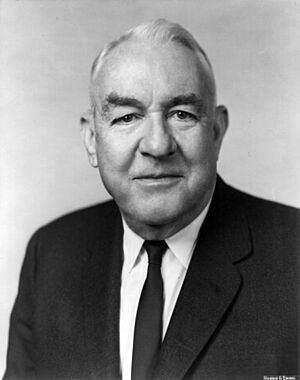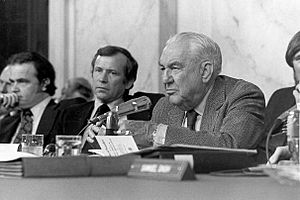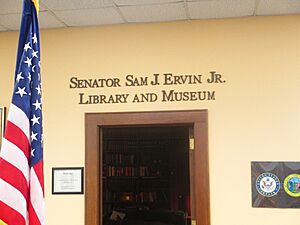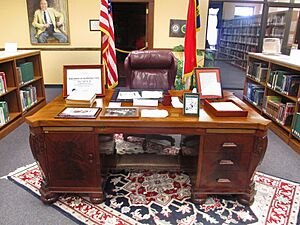Sam Ervin facts for kids
Quick facts for kids
Sam Ervin
|
|
|---|---|
 |
|
| United States Senator from North Carolina |
|
| In office June 5, 1954 – December 31, 1974 |
|
| Preceded by | Clyde R. Hoey |
| Succeeded by | Robert Morgan |
| Member of the U.S. House of Representatives from North Carolina's 10th district |
|
| In office January 22, 1946 – January 3, 1947 |
|
| Preceded by | Joseph Ervin |
| Succeeded by | Hamilton C. Jones |
| Member of the North Carolina House of Representatives from the Burke County district |
|
| In office 1931–1933 |
|
| Preceded by | John Mull |
| Succeeded by | Francis Garrou |
| In office 1923–1927 |
|
| Preceded by | Joseph Cooper |
| Succeeded by | John Giles |
| Personal details | |
| Born |
Samuel James Ervin Jr.
September 27, 1896 Morganton, North Carolina, U.S. |
| Died | April 23, 1985 (aged 88) Winston-Salem, North Carolina, U.S. |
| Political party | Democratic |
| Spouse |
Margaret Bruce Bell
(m. 1924) |
| Children | 3, including Samuel |
| Education | University of North Carolina at Chapel Hill (BA) Harvard University (LLB) |
| Awards | |
| Military service | |
| Allegiance | |
| Branch/service | |
| Years of service | 1917–1919 |
| Rank | Private |
| Unit | 28th Infantry Regiment, 1st Infantry Division |
| Battles/wars | World War I |
Samuel James Ervin Jr. (September 27, 1896 – April 23, 1985) was an American politician. He served as a U.S. Senator for North Carolina from 1954 to 1974. He often called himself a "country lawyer" and was known for telling funny stories.
At first, Ervin strongly defended Jim Crow laws and racial segregation. He was seen as the South's expert on the Constitution during debates about civil rights. But later, he surprised many by becoming a hero for supporting civil liberties. He is best known for leading two major investigations. One helped bring down Senator Joseph McCarthy in 1954. The other was the Senate committee's investigation into the Watergate scandal. This investigation led to President Richard Nixon's resignation in 1974.
Contents
Early Life and Education
Ervin was born in Morganton, North Carolina. He fought in World War I in France with the First Division. He earned several awards for his bravery, including the Distinguished Service Cross and two Purple Hearts.
He graduated from the University of North Carolina at Chapel Hill in 1917. He then went to Harvard Law School, finishing in 1922. Ervin liked to joke that he went through Harvard Law "backwards." This was because he took the third-year courses first.
Even before finishing law school, Ervin became a lawyer in 1919. He entered politics right after Harvard. He was elected to the North Carolina House of Representatives in 1922, 1924, and 1930. He also served as a state judge in North Carolina in the late 1930s and early 1940s.
Becoming a U.S. Senator
In 1948, Ervin became an associate justice on the North Carolina Supreme Court. In June 1954, he was chosen to fill a vacant U.S. Senate seat. He then successfully ran for the seat in November 1954.
Senator Ervin had a big impact on American history. He worked on two important committees that helped bring down powerful figures. In 1954, he was part of a committee that investigated Senator Joe McCarthy. Later, he led the committee that investigated the Watergate scandal. This committee was widely known as the "Ervin Committee."
Civil Rights and the Constitution
In 1956, Senator Ervin helped write "The Southern Manifesto." This document encouraged resistance to the 1954 Brown v. Board of Education Supreme Court decision. That decision called for schools to end segregation. Most Southern members of Congress signed the Manifesto. Later in his life, Ervin said he changed his mind about the Brown decision. He believed ending forced segregation was right.
Some people say Ervin's opposition to civil rights laws was because he wanted to protect the Constitution. He believed the Equal Protection Clause applied mainly to white men. He often said that Americans had a right to their "prejudices." However, many believe he was more concerned about federal power than personal prejudice.
Ervin also opposed the Immigration and Nationality Act of 1965. This law ended nationality quotas for immigrants. He believed the number of immigrants allowed from a country should be based on how many people from that country already lived in the U.S.
Supporting Civil Liberties
Despite his views on civil rights, Ervin became a hero for liberals. This was because he strongly supported civil liberties. He opposed "no knock" search laws. He also spoke out against the use of data banks and lie-detector tests. He saw these as invasions of privacy.
In 1966, Senator Ervin helped defeat a plan to allow prayer in public schools. He also supported the exclusionary rule under the Fourth Amendment. This rule makes illegally gathered evidence unusable in criminal trials.
Leading the Watergate Investigation

Ervin became very famous for leading the Senate Watergate Committee. This committee investigated the 1972 presidential election scandal. The Senate Majority Leader chose Ervin because he was not running for re-election. He also had a deep knowledge of law and the Constitution.
During the hearings, it was revealed that President Nixon had a secret taping system in the Oval Office. Ervin announced that the committee would demand these Nixon White House tapes. He famously said that Watergate was worse than the American Civil War for the country.
He also had a memorable debate with Nixon's advisor, John Ehrlichman. Ervin questioned if the Constitution allowed a President to approve actions like the White House Plumbers' break-in. This break-in happened at the Democratic National Committee headquarters in the Watergate complex.
Ervin: But the foreign intelligence activities was not – had nothing to do with the...the opinion of Ellsberg's psychiatrist about his intellectual or emotional or psychological state!
Ehrlichman: How do you know that, Mr. Chairman?
Ervin: Because I can understand the English language! It's my mother tongue!
After the 1972 elections, Ervin suggested five new laws. These laws aimed to limit the power of the presidency. For example, some would give Congress more control over how the President used money. Others would increase Congress's oversight of appointed officials.
Later Life and Legacy
Ervin left the Senate in December 1974. After retiring, he continued to practice law and wrote several books. He also appeared in commercials.
Samuel Ervin Jr. died in 1985 at age 88. His funeral was attended by many important people, including former President Richard Nixon.
Ervin's son, Samuel J. Ervin, III, became a judge in 1980. His grandson, Sam J. Ervin, IV, was elected to the North Carolina Supreme Court in 2014.
Ervin's old office and personal library are now a museum. It is called the "Senator Sam J. Ervin Jr. Library and Museum." It is located at Western Piedmont Community College in Morganton.
Protecting Privacy
Ervin was a strong supporter of data privacy. He worried about how much personal information was being collected. He warned that "The computer never forgets." He believed people should have private thoughts and dreams. He felt these should be beyond the reach of government or employers.
Awards and Sayings
- 1972: Paul White Award, Radio Television Digital News Association
- 1981: Golden Plate Award, American Academy of Achievement
Ervin had many famous sayings. When asked about people needing "backbone" in public life, he joked about Gordon Liddy:
Well, Gordon Liddy has a little too much backbone. I'll have to admit that I have a sort of sneaking admiration for a fellow like Gordon Liddy that does have an excess of backbone. His backbone exceeds his intelligence, really.
He also strongly opposed polygraph tests, calling them "20th century witchcraft." He believed they invaded a person's mind and privacy.
He also spoke about the importance of keeping religion and government separate:
Political freedom cannot exist in any land where religion controls the state, and religious freedom cannot exist in any land where the state controls religion.
On civil liberties, he said:
"Equal civil liberties for all and special civil rights for some are incompatible in concept and operation."
See also
- List of members of the American Legion
- Slow Burn (podcast)
 | George Robert Carruthers |
 | Patricia Bath |
 | Jan Ernst Matzeliger |
 | Alexander Miles |




